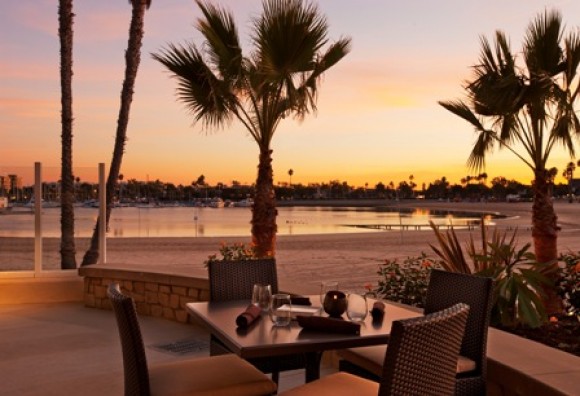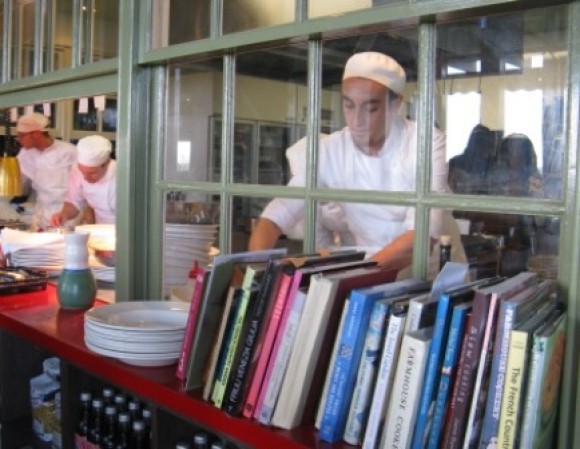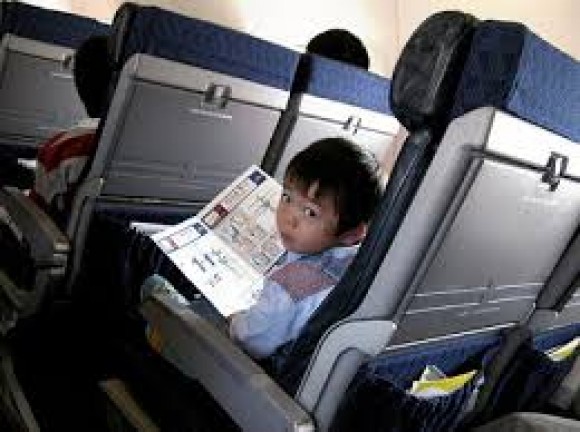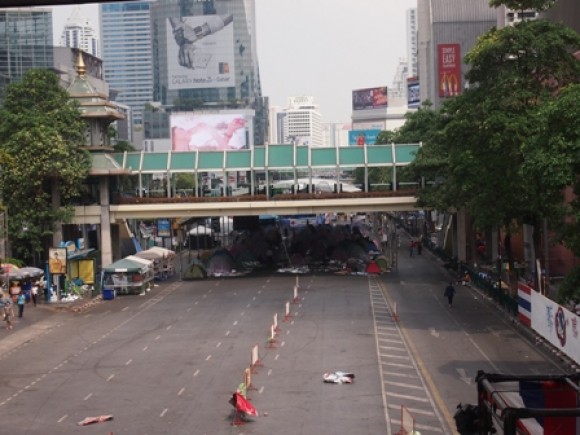What’s happening in Bangkok?
Earlier this week I visited Thailand to witness to the latest developments concerning the anti-government protests.
To avoid any conflict of interest claims, I state now that I travelled as a guest of the Tourism Authority of Thailand and Thai Airways.
As always when I’m invited to travel as a guest, I first make clear to my hosts that I intend to report whatever I experience without fear or favour. I value my independence and editorial freedom more highly than anything else.
What did I witness?
I can say that a lot of confusion, rumour-mongering and misinformation pervades the global mainstream view of the current situation.
In a front page story published Thursday 27 February 2014 in Melbourne’s The Age newspaper, journalist Lindsay Murdoch, also present in Bangkok last week, quotes from www.smarttraveller.gov.au in a plea to warn off tourists visiting Thailand (in particular Bangkok). Elaborating his claim that tourists are not being properly warned about the dangers posed in lingering around protest sites in central Bangkok as advised by Australia’s Department of Foreign Affairs and Trade (DFAT), he quotes “We continue to advise travellers to avoid all protest sites and surrounding areas, political rallies and processions through Bangkok and in other locations, political events and large scale public gatherings due to the risk of further violence and terrorism.”
Murdoch adds, “It should read “do not enter” the sites under any circumstances.”
(See www.theage.com.au/travel/travel-news/what-the-government-isnt-telling-you-about-bangkok-20140226-hvdvg.html for the complete story)
I disagree with his “do not enter the sites under any circumstances” warning.
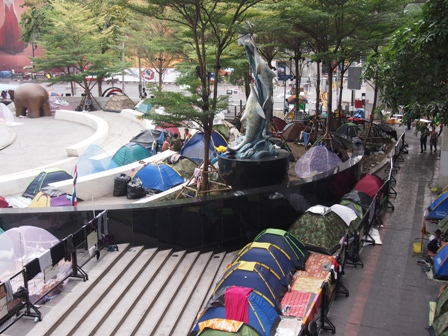
Protest camp outside Central World shopping centre at Phoen Chit
My assessment of the situation in Bangkok is one of contrasting impressions based in a few essential truths.
Yes, there have been deaths in the streets of Bangkok.
Yes, there are terrorist elements to these strikes on innocent protesters.
In my view the situation appears to be nearing an end-point, an opinion I heard shared by various business contacts and also supported by military sources. I don’t think this opinion is one entirely based on optimism. I think it’s based on an accurate reading of the facts as they stand now.
However, the outcome will likely result in increased retaliatory street fighting if Thaksin/Yingluck family supporters rally round their apparently lost cause in an effort to regain control.
I write ‘lost cause’ because I now believe Yingluck’s government is a lost cause.
Her brother Thaksin made a serious mistake when he refused to face trial for corruption charges when his sister was elected to government two years ago. Had he returned then to Thailand and faced justice, the current situation would not have occurred.
In today’s news (28 February 2014) ‘caretaker’ government supporters are reported to have increased pressure on anti-government protesters. Since November 2013, the Thaksin/Yingluck camp of loyalists has been largely absent from widespread protest movements. Their manipulations to discredit anti-government protests have mostly transpired away from broader public attention.
Now they are making their presence widely known, an example of ‘forget-us-not’ politics?
Clearly, matters of government control are not yet settled.
Estimates of anti-government support range from between 60% to 70% of the general population.
Though Yingluck/Thaksin supporter numbers are dwindling, they are still a force with which to reckon.
Why is the majority of Thai people so angry and disillusioned with the present so-called ‘caretaker’ government?
Here are a few pertinent reasons.
Various sources informed me that not once have Yingluck’s cabinet met in Thailand. All meetings have taken place outside Thailand, in Cambodia, Indonesia or Dubai. The inference is that Thaksin sits in on these high level government meetings while he pulls his sister’s puppet strings.

Sandbag barricade near Army headquarters.
Thousands of protesters claim Thaksin’s fortune effectively bought his sister’s win at the last election, in their view deeming its result null and void.
Such is the substance of the rumours circulating throughout Thailand now and during the last two years.
Last year when Yingluck’s government promised farmers that it would guarantee a price for their rice harvest and this year failed to deliver on its promise leaving farmers seriously out-of-pocket with mountains of unsold rice rotting in warehouses, the situation took a huge turn for the worse.
Many farmers aren’t able to feed their families as a result of this populist and mismanaged policy.
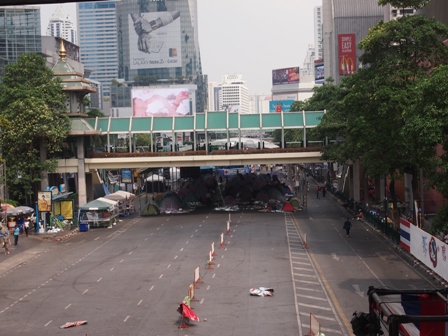
Ratchaprasong Road protest site.
Compared with the debilitating 2009 protests when a clear divide existed between educated, royalist leaning urban middle and upper class ‘Yellow Shirts’ and poorer, less educated and rural ‘Red Shirts’, the current protesters are a melding of the two sides of the political fence.
Now they share a common goal, that is to get rid of the ‘caretaker’ PM Yingluck Shinawatra and her PM-in-hiding brother Thaksin Shinawatra.
The majority of protesters (former ‘Yellow Shirts’ have combined with disillusioned former Thaksin supporting ‘Red Shirts’) continue their battle to oust what they see as a corrupt government. After four months of largely peaceful demonstrations, patience is also wearing thin.
The demand for PM Yingluck Shinawatra’s resignation is apparently non-negotiable.

Anti-Yingluck protest sign near Army headquarters
A resolution to this ongoing crisis will undoubtedly be met soon.
As the hot season approaches, when temperatures in Bangkok reach 38C and 39C on a daily basis while humidity increases to extreme discomfort levels, tempers will increasingly fray.
When the monsoon rainy season hits Bangkok from June until October, deluging streets filled with flimsy tent-cities occupied by anti-government activists, I believe most protesters will demand a finish to this conflict so they can get on with their lives in a refreshed effort to co-exist peaceably in a democracy where corruption is reduced or hopefully eliminated.
Sadly, both sides have within their ranks people willing to maim and kill innocent citizens to justify their cause. The perpetrators of the latest killings remain at large though the police have stated in press releases that the criminals will be hunted down.
I wandered through various protest sites last week, both during the day and at night.
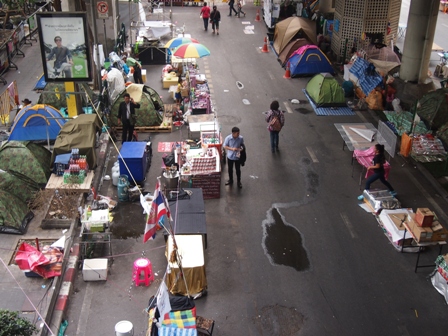
Phoen Chit Road protest site
The protest sites I observed had a surprisingly party like atmosphere. Amidst the political speeches there is pop music, impromptu performances and sporadic dancing. Local businesses and Bangkok’s municipal government have provided drinking water, toilets and bathing facilities so protesters can stay on site all day and night. Road side stalls do a roaring trade feeding and watering the protesters. Rubbish collection is kept up on a daily basis. These were some of the cleanest protest camps I’ve ever seen.
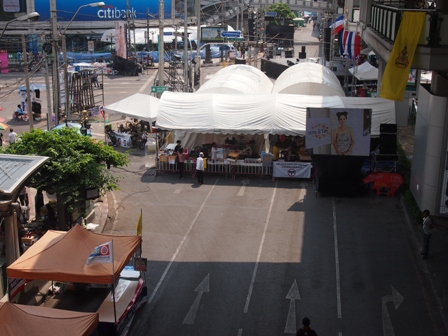
Protest site at Phoen Chit
At no time did I ever feel unsafe or threatened.
The protest sites I frequented most often were at Asoke and Phoen Chit near the Central World shopping centre where two children were killed and nearly 30 people injured last Sunday 23 February. I walked down the street where the bombing occurred near the shopping centre the following day. (see photo above)
Within 24 hours after last Sunday’s violent attack all businesses around Central Plaza were operating as normal (albeit with increased security upon entry to the shopping centre itself) in the very busy, high-end shopping area around Phoen Chit at the intersection of Ratchaprasong and Ratchadamri roads.
Further east as Phoen Chit Road changes names to Sukhumvit Road near the Asoke Skytrain stop (one of Bangkok’s busiest retail and hotel strips where tourist and local Thai people mix 24/7) street stall vendors were doing a lively trade in cold drinks, snack foods, gadgets, trinkets, tourist tat and the occasional fake Rolex wristwatch from dawn until late at night. In the side streets (called ‘soi’) all the massage parlours, bars, nightclubs, restaurants and cafes I observed were busy and lively.
I also visited the area around the Army/Defence Ministry headquarters where the protests have a much more serious aspect. I would not want to be wandering around there at night and I advise all travellers to avoid that area at all times.
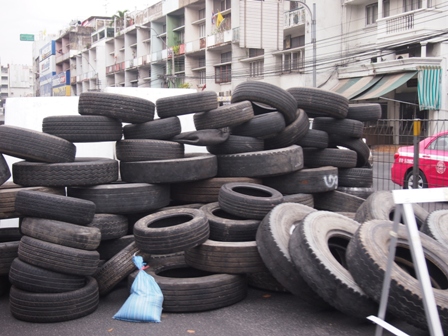
Tyre roadblock near Army headquarters
My advice is to visit Bangkok with a high degree of street smarts. Tourists are not the targets here. Anyone could be unlucky enough to get caught in the metaphorical or much worse, very real, crossfire. I recommend maintaining a heightened vigilance while wandering in Bangkok as a precautionary measure but don’t overreact to mainstream claims that all protest areas should not be entered under any circumstances.
While many of Bangkok’s busiest intersections remain closed to vehicular traffic because of the protest sites and the ‘Shut Down Bangkok’ movement, journeys across town may take much longer than anticipated. Use the Underground (MTR) or Skytrain (BTS) public transport systems whenever possible to avoid delays. Also consider using the ever popular motorcycle taxis; they’re cheap and fast though travel at your own risk.
Clearly reports in the mainstream press have an impact on tourism. Visitor numbers from China and Japan are significantly down compared to this time last year.
Though tourism numbers overall have slightly decreased compared to last year’s data, Bangkok (and Thailand in general) continue to be a very popular destination for international travellers. The hotel where I stayed just off Sukhumvit Road near Asoke Station is operating at over 80% capacity according to its General Manager Mr Eric Hallin. (see www.rembrandtbkk.com)
I suggest that all travellers who love Thailand as I do continue to lend support to peaceful demonstrations while protesters exercise their democratic right to express their dissatisfaction at a corrupt government.
Thailand derives the majority of its national income from tourism. Thousands, if not millions, of honest, hard-working Thai people will experience great hardship if tourists are frightened off visiting this ‘Land of Smiles’.
Though I deplore the strong-armed tactics paid thugs are using to force this crisis to a conclusion in their favour, my impression is that the majority of Thais overwhelmingly support a peaceful negotiation process to end this strife and are equally disgusted by the recent violent acts.The last thing the majority of Thai people want is a civil war. Nor do they want their country perceived as a ‘failed state’ by the rest of the world.
The recent killings of innocent children are sickening to Thai people as they are to the rest of the civilised world.
Remember that fact.
Finally, I always advise people to travel safely, in Thailand just as you would naturally do anywhere else.
Editor’s Note:
As of 3 March, 2014 all protests sites have been shut down. A single protest site operates in Lumphini Park (near the Tourist Police station) where peaceful protests will continue while the current government serves in caretaker mode.
By 21 March, 2014 Thailand’s high court ruled that the February election result is null and void.


